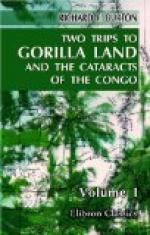The adjectival form is archaically expressed by a second and abstract substantive. This peculiarity is common in the South African family, as in Ashanti; but, as Bowdich observes, we also find it in Greek, e.g. Greek , “heresies of destruction” for destructive. Another notable characteristic is the Mpongwe’s fondness for the passive voice, never using, if possible, the active; for instance, instead of saying, “He was born thus,” he prefers, “The birth that was thus borned by him.” The dialect changes the final as well as the initial syllable, a process unknown to the purest types of the South African family. As we advance north we find this phenomenon ever increasing; for instance in Fernando Po; but the Mpongwe limits the change to verbs.
Another distinguishing point of these three Gaboon tongues, as the Rev. Mr. Mackey observes, is “the surprizing flexibility of the verb, the almost endless variety of parts regularly derived from a single root. There are, perhaps, no other languages in the world that approach them in the variety and extent of the inflections of the verb, possessing at the same time such rigid regularity of conjugation and precision of the meaning attached to each part.” It is calculated that the whole number of tenses or shades of meaning which a Mpongwe radical verb may be made to express, with the aid of its auxiliary particles, augmentatives, and negatives—prefixes, infixes, and suffixes—is between twelve and fifteen hundred, worse than an Arabic triliteral.
Liquid and eminently harmonious, concise and capable of contraction, the Mpongwe tongue does not deserve to die out. “The genius of the language is such that new terms may be introduced in relation to ethics, metaphysics, and science; even to the great truths of the Christian religion.”
The main defect is that of the South African languages generally--a deficiency of syntax, of gender and case; a want of vigour in sound; a too great precision of expression, rendering it clumsy and unwieldy; and an absence of exceptions, which give beauty and variety to speech. The people have never invented any form of alphabet, yet the abundance of tale, legend, and proverb which their dialect contains might repay the trouble of acquiring it.
Chapter V.
To Sanga-Tanga and Back.
My objects in visiting Mbata, the reader will have understood, were to shoot a specimen or specimens of the gorilla, and, if possible, to buy or catch a youngster. Even before landing, the pilot had assured me that a “baby” was on sale at the Comptoir, but on inquiry it proved to have died. I was by no means sanguine of success—when the fight is against Time, the Old Man usually wins the day. The short limits of my trip would not allow me to wander beyond the coast and the nearer riverine regions, where frequent villages and the constant firing of muskets have taught all wild animals that flight is their only defence; thus, besides being rare, they must be shy and timid, wary and knowing, “like an old hedgehog hunted for his grease.” The first glance at the bush suggested, “Surely it is impossible to find big game in such a land of farms and plantations.”




